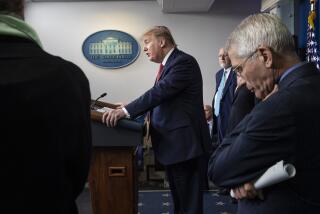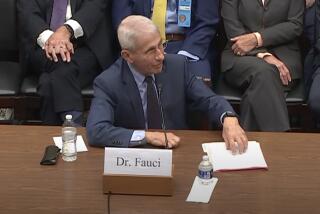Benghazi hearing ends after extraordinary 11-hour grilling of Clinton
Reporting from Washington — Republicans grilled former Secretary of State Hillary Rodham Clinton through nearly 11 hours Thursday in a long-awaited hearing of the House Benghazi committee that produced little if any new information, but ample partisan argument.
The hearing provided an extraordinary spectacle, starting in the morning and stretching well into the night, far longer than such sessions typically last even with multiple witnesses.
Through the lengthy session, Clinton maintained a relentlessly calm and smiling demeanor, showing few visible signs of fatigue other than a hoarse throat that began to develop in the 10th hour.
From her opening statement on, she sought to seize a rhetorical high ground above the partisan fray, reminding members of the panel that after attacks on diplomatic facilities during the administrations of Ronald Reagan, Bill Clinton and George W. Bush in which hundreds of Americans were killed, members of both parties “rose above politics” to examine what had gone wrong.
In investigating the deaths of Ambassador J. Christopher Stevens and three other Americans in the Sept. 11, 2012, attacks in the Libyan city of Benghazi, “Congress has to be our partner as it has been after previous tragedies,” Clinton said.
“We need leadership at home to match our leadership abroad,” she said in her opening statement. “Leadership that puts national security ahead of ideology.”
Clinton’s appearance was preceded by several weeks of bad publicity for the committee, starting when House Majority Leader Kevin McCarthy (R-Bakersfield) said in a television interview that the panel had succeeded in driving down Clinton’s poll ratings.
Democrats, who had long charged the committee with partisanship, have relentlessly repeated McCarthy’s words.
As a result, panel Chairman Trey Gowdy (R-S.C.) began the hearing on defense, using his opening statement to justify the panel’s existence.
Although seven previous congressional investigations had examined the Benghazi attacks, “those previous investigations were not thorough,” Gowdy said. The current panel was seeking “the truth,” he declared.
See the most-read stories this hour >>
But if one of Clinton’s goals was to convey an image of being more composed and serious than her inquisitors, members of the committee often appeared to help, engaging in one high-decibel shouting match and numerous partisan jabs.
The committee’s seven Republicans and five Democrats squabbled over the cost to taxpayers of the multiple investigations, the conduct of the State Department in responding to those inquiries, even the length of the hearing, itself.
“We’ve been here for 9 1/2 hours, and the questions are increasingly badgering ... increasingly vicious,” Rep. Adam Smith (D-Wash.) said as the evening wore on and Republican members turned from questions about the attack to inquiries about Clinton’s use of a private server for her emails while she headed the State Department.
“They simply wish to wear you down.”
The hearing has been eagerly anticipated for its potential impact on next year’s election. Partisans on both sides anticipate that if Clinton is the Democratic nominee, mobilizing each party’s supporters will be a higher priority than finding or converting the relative handful of voters who remain undecided about her.
Both parties think the committee proceedings could help in the mobilization effort.
Among Republicans, “Benghazi” has become a watchword on the campaign trail -- an almost all-purpose label for sins of both omission and commission that GOP voters perceive in the former secretary of State’s record.
Democrats are equally convinced that the committee provides an example of Republican unfairness and excess. The committee’s Democratic members made more than a dozen references to the panel’s $4.7-million price tag, saying that the GOP was wasting taxpayer money in an effort to harm Clinton’s campaign.
Republicans have hoped the hearing would produce slip-ups by Clinton that could be used to mobilize opposition in next year’s election. An exasperated outburst she made when she last testified about Benghazi, almost three years ago, has become a GOP talking point.
Democrats, always nervous about Clinton’s tendency to become defensive when criticized, watched to see how she parried the GOP attacks.
As the evening wore on, Democratic apprehensions turned to applause as party spokespeople rushed to congratulate Clinton on her stamina and to denounce the committee for what they saw as a partisan inquisition.

Democratic presidential candidate Hillary Rodham Clinton told a congressional panel Thursday she took responsibility for the 2012 attacks in Benghazi, Libya. But she firmly defended her actions afterward and called for unity and leadership over part
Gowdy conceded after the hearing that Clinton’s lengthy testimony had broken little new ground.
“I don’t know that she testified much differently today than when she previously testified,” he said.
The hearing began on a testy note as Gowdy and the senior Democrat on the panel, Rep. Elijah E. Cummings of Maryland, sparred over whether the panel’s work was merely repeating what other investigations had done.
A few hours later, the two men, joined by Rep. Adam B. Schiff (D-Burbank), escalated their conflict, engaging in an angry procedural fight over whether to release the transcript of the committee’s interrogation of Sidney Blumenthal, a longtime friend of Clinton’s and an aide to her husband.
As Clinton watched, smiling, Cummings -- shouting across the committee dais -- accused Gowdy of selectively releasing Blumenthal’s emails in order to make false allegations. Gowdy accused the Democrats of attempting to disrupt the committee’s proceedings, then vowed to investigate Clinton’s old friend further.
“If you think you’ve heard about Sidney Blumenthal so far, wait until the next round,” he said before stalking out of the committee room for a lunchtime recess.
When the committee reconvened, the members voted 7 to 5, along party lines, not to release the transcript.
Blumenthal remained a major focus in the committee’s afternoon session, with Gowdy and other Republicans questioning why he had such ready access to Clinton.
“I don’t know what this line of questioning does to help us get to the bottom of the deaths of four Americans,” Clinton responded to Gowdy at one point.
Said Schiff: “I just don’t understand the preoccupation with Sidney Blumenthal. You would think he was in Benghazi, manning the barricades.”
NEWSLETTER: Get the day’s top headlines from Times Editor Davan Maharaj >>
As the questioning unfolded, Republican members of the panel pursued several disparate lines of questioning.
Several repeatedly accused Clinton of denying requests from Stevens and other American diplomats for more security. Clinton, repeating a position she has taken since the controversy over the Benghazi attack began, said that she had relied on the judgment of the State Department’s security professionals.
Gowdy, a former federal prosecutor from South Carolina, cited cables from Stevens to the State Department warning that the security situation at American installations in Libya was deteriorating and needed to be bolstered. The administration did not fully heed those his warnings.
Gowdy juxtaposed those messages against emails from Blumenthal that were getting Clinton’s attention. Blumenthal, a former journalist and Clinton administration operative whom the Obama White House had banned from working at the State Department, offered voluminous advice to Hillary Clinton on Libya, including how she could use the overthrow of its dictator to her political gain.
Clinton repeatedly denied that Blumenthal had been an important advisor to her or a major source of information about Libya.
“I don’t want you to have a mistaken impression about what I did and how I did it,” she said of the attention her emails had gotten.
“Most of my work was not done on emails,” she said, adding that she did not even have a computer in her State Department office.
Rep. Peter J. Roskam (R-Ill.) sought to portray Clinton as the chief architect of U.S. policy toward Libya, accusing her of forcing a reluctant Obama administration to take an active role there and then trying to take political credit for it.
Some of the most personal questioning came from Rep. Jim Jordan (R-Ohio), who suggested that in the days after the attack, Clinton had tried to hide information about the motivation of the attackers in order to influence the 2012 election.
“It’s just 56 days before an election” and “you can’t be square with the American people,” Jordan said. Clinton and other Obama administration officials had downplayed the terrorist nature of the attack “because Libya was supposed to be this great success story,” Jordan said.
“Americans can live with the fact that good people sometimes give their lives for this country,” he said, but not “when their government’s not square with them.”
With a rare note of irritation entering her voice, Clinton shot back that “the insinuations that you are making do a disservice” to government officials who were trying to do “the best we could with the information we had.”
The GOP allegation that she had failed to take security requests seriously is “a very personally painful accusation,” she said a few minutes later. “It has been rejected and disproven by nonpartisan and dispassionate investigators.”
“I’ve lost more sleep than all of you put together,” she told the panel members.
The assaults in Benghazi began when dozens of attackers overran guards at the U.S. diplomatic compound there and ran through it, setting fire to buildings, including the one in which Stevens and another State Department employee were hiding. The two died of smoke inhalation. The attacks continued into the next morning, when mortar rounds were fired at a nearby CIA annex, killing two more Americans.
SIGN UP for the free Essential Politics newsletter >>
Clinton last testified about the attack in January 2013, before the Senate Foreign Relations Committee. It was a heated exchange. Republicans on the panel accused the administration of botching the U.S. response to the attacks. They took aim at its confusion about what happened, and its early explanation -- later proved wrong -- that the compound was overrun not by a terrorist attack but a demonstration that got out of control.
Clinton famously scolded the committee for its focus on the motivations of the attackers and how the Obama administration initially got it wrong. “What difference, at this point, does it make?” she said in a testy back-and-forth with committee Republicans, adding, “It is our job to figure out what happened and do everything we can to prevent it from ever happening again.”
Democrats on the current committee have repeatedly attacked the direction of the investigation. They accuse Gowdy of failing to interview potential witnesses with firsthand knowledge of what happened in the attack and instead using committee resources to drag top Clinton operatives into closed-door interrogations in a bid to generate headlines.
Last week, the committee spent hours interviewing longtime Clinton advisor Huma Abedin and even alerted the media to the location of the questioning, which was closed to the public.
The five Democrats on the committee are contemplating whether to resign from the panel altogether in protest. Schiff said whether the Democrats remain on the panel may depend on “just how long they intend to keep this thing alive.”
“At a certain point, we may very well reach the conclusion that the diminishing returns of our continued participation don’t outweigh the liability of giving it any respectability,” he said.
Twitter: @evanhalper
ALSO
Joe Biden offers a new account of his role in the Bin Laden raid
Gavin Newsom sets his sights on a well-armed foe: The gun lobby
How Black Lives Matter became a thorn in the side of L.A. leaders
More to Read
Get the L.A. Times Politics newsletter
Deeply reported insights into legislation, politics and policy from Sacramento, Washington and beyond. In your inbox three times per week.
You may occasionally receive promotional content from the Los Angeles Times.












